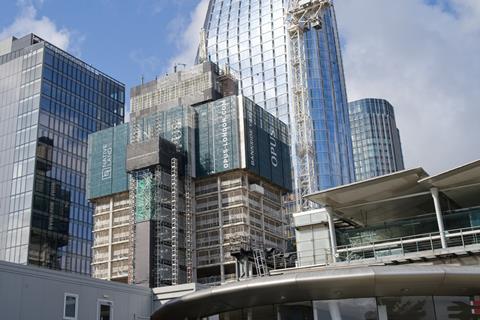Consultant says risk-averse contractors in capital taking longer to sign on dotted for jobs
London cost consultant Exigere has warned the main impact of US president Donald Trump’s trade war will be the effect on investor sentiment and whether tariffs will put the brakes on construction demand.
In its latest market update for Q2, the firm said it didn’t expect too much direct impact from Trump’s decision to introduce tariffs on a swathe of countries – including a 10% baseline rate on the UK.
Earlier this week, Trump paused tariff hikes on most countries for 90 days which saw the European Union put retaliatory tariffs on hold.

But the trade war between the US and China has deepened, after Trump imposed 125% tariffs on Chinese goods and China retaliated with 84% levies.
In its report, the first few pages of which were devoted to the impact of tariffs, Exigere said: “Proportionately, UK imports for construction-related materials and equipment comes mostly from Europe and China, although a significant proportion is produced domestically. We do import some materials, machinery, plant and equipment form the US but we have minimal exposure in the main.”
But it added: “[Trump’s tariffs] will inevitably hit growth projections, and in conjunction with recent PMI figures, the possibility of a recession is back on the table, if not already here. Indeed, with wider global uncertainty, disruption and the potential impacts on growth, this may cause further short to medium-term hesitancy in investment and dampen demand for construction.”
Exigere said the sector was still a good bet but warned: “The priority is to stay calm, identify the opportunities and act on them through considered, targeted action with the right partners and behaviours.
“While the immediate outlook for the coming year now remains even more uncertain, reflecting an unpredictable global economic and geopolitical climate, we see positive indicators over the mid-and long term.
“Interest rates are falling, albeit perhaps slower than had been anticipated. GDP growth, whilst minimal, was taking place, but this may now be further hampered. Demand is there for the right product. Longer term, the economics are slowly heading in the right direction to unlock the supply.”
Meanwhile, the firm said contractors in the central London market were continuing to take their time before signing on the dotted line for jobs.
“Fingers were burnt in the past decade, with some contractors overstretching themselves in terms of their capacity and ability to deliver work,” Exigere said.
“A cocktail of insolvencies, a fragmented, under-resourced industry, continued planning and regulatory change, evolving design driven by tenant demand and growing pains adopting the �ڶ����� Safety Act, are all impeding development and driving up construction sector costs.
>>See also: Can Starmer get us out of the mess of Trump’s tariffs?
>>Trump tariffs could make investors pause funding for major schemes, experts warn
>>Clients keeping cool amid Trump tariff chaos, says Turner & Townsend Alinea
.“All these factors contribute to a significant proportion of Tier 1 contractors continuing to feel risk-averse this spring. They want to consolidate, protecting their existing projects, specialisms, and partnerships, rather than experimenting and expanding.”
It added: “This is being reflected in the type and number of projects they will take on, as well as the risks they are prepared to take. They are generally only taking on projects in sectors which are a strong match for their skillsets and are achievable within their current capacities. Relationships, with both consultants and, more importantly, clients, are a material consideration for contractors.”

But the consultant said both contractors and clients were being less adversarial in contract negotiations. “There is a flight to quality taking place, driving good behaviour and rewarding those taking a realistic approach to contract negotiations. Many successful industry players are characterised by their collaborative, flexible, and equitable behaviours.”
Exigere said the central London office market was on the mend as top-end, available new space begins to dry up and more companies switched the working balance to being in the office. “Expectations for full-time office attendance are increasing. This return to the office, coupled with a shortage of new provision over the past five years is driving up Grade A rents for prime, low-carbon office spaces.”
It added the hotel sector was also on the rise with investment returning to pre-pandemic levels while a Deloitte poll said London was the most attractive European city for hotel investment in 2025.
The consultant said the biggest cost pressure facing firms in the coming months was the increase in National Insurance rates as well as the increase in the minimum wage.
Exigere said it expects tender price inflation to be 3.25% for the rest of the year, rising to 3.75% next year and staying flat in 2027.



























No comments yet